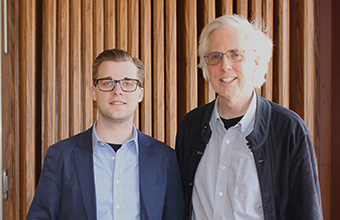College of Arts and Sciences Newsroom

Herbenick Award Winner
University of Dayton junior John "Jake" Larmann was presented with the Raymond M. Herbenick Award at the 31st annual Core program graduation banquet, Sunday, April 8.
The Herbenick Award is presented annually and recognizes a graduating Core student who best exemplifies the Core program and its commitment to interdisciplinary integration. Instituted by the department of philosophy in 1999, the award was named to honor the memory of 30-year philosophy professor and founding Core faculty member Ray Herbenick.
Core is a challenging two-and-a-half year interdisciplinary curriculum that stresses connections between academic disciplines. Courses center around a common theme, “Human Values in a Pluralistic Culture,” and they fulfill many of the University’s Common Academic Program requirements. Core is the longest running learning living community at the University, and students who successfully complete the program “graduate” from Core in spring of junior year.
“It really meant so much to win this award because it is the first time I am being formally acknowledged for being who I trust myself to be — someone who does take time to think and raise questions I believe to be legitimate, which is really what Core is about,” Larmann said.
A Cincinnati native, Larmann is an English major with a double minor in philosophy and film studies. A former Core Fellow student tutor, Larmann also assisted first-year Core students with class assignments, readings and essay exam preparation. Fellows are instrumental in helping first-year Core students traverse the first fall and spring semester 15 semester hour course sequence, The Development of Western Culture in a Global Context - ASI 110/120.
“[Core] isn’t a ‘circle the best answer’ type class or program,” Larmann said. “It is far beyond memorization. It is about deep thinking and critical analysis and saying that through writing. The best thing about being a Fellow was knowing the material well enough to fuel discussion among first-year students, and help them understand what could sometimes seem like incomprehensible material. It’s those moments that reminded me of why I loved Core from the beginning.
“Sitting in Sears (Recital Hall) that first day, something really clicked within my inner ambition. I knew this was something I could greatly excel in, and I had never felt that way about school before. This was a program that emphasized your individual thoughts, how you could express them, argue them and defend them, and that was all through your writing.”
Core is consistently evaluated as meeting the highest level of first-year writing achievement at the University, and last year, three Core students won Fulbright scholarships.
“First-year Core is about the total combination of the humanities; it is understanding literature or a historical event by not just what happened, but the philosophies and religious motivations behind those events,” Larmann said. “I joked about this in the middle of my first year that Core should also give you some sort of psychology credit because if you really are doing the work, you’re getting into the heads of the people at so many different times.”
Larmann developed a strong rapport with many Core professors, five of whom nominated him for the Herbenick Award. John Inglis, professor of philosophy, and one of Larmann’s nominators who presented the Herbenick Award to Larmann, said Larmann has a knack for making connections with others and building community. Inglis recounted a story from last fall when Larmann tweeted a photo of first-year Core students against a large sheet sign in the student neighborhood to University President Eric F. Spina asking him about the meaning of community.
Spina responded by stating community means, “Relationships in which each one selflessly supports the dignity of others and accepts difference.”
“Jake’s visual question and Dr. Spina’s response captures something of the interactive magic that Jake brings into the classroom and beyond through relationships with students and professors alike,” Inglis said. “He captivates professors through his written work, much as he generates discussion in class and among students with his generous and thoughtful demeanor.”
Larmann said Inglis had a profound impact on his Core experience, and he ranks Inglis as one of his best professors.
“He really showed me that professors are much more than educators here. They are people you can trust, talk to and work with on so many levels,” Larmann said. “He trusted me to be a leader in the classroom, to get people engaged and to say the controversial opinion to spark debate. He played the role of a great mentor to me, encouraging me to express myself and not conform for the sake of getting by with others.”
Larmann’s Core program coursework is now complete, but his unwavering loyalty and involvement remain steadfast. He continues to represent Core at various campus-wide events, and he will resume residence for a second consecutive year in one of two Core program special interest houses in the student neighborhood. Along with his housemates — most of them Core students — he plans further program visibility and promotion of community to Core students in all stages of the program.
Larmann believes the relationships among his fellow Core students formed a framework for an exceedingly rewarding experience.
“Core has vastly expanded how I think, and how I continue to question everything,” he said. “So many [peers] have helped me better myself as a person, seeing myself, others and life differently and more openly; I feel indebted to them for that. It really is a unifying two-and-a-half years. The freedom you have to think and the relationships you form are second to none.”
As Larmann begins the transition into his senior year, he will complete a summer internship in Los Angeles for a small production company with hopes of building initial groundwork for a future career as a screenwriter and filmmaker.
- Marissa McCray ’00, Core program assistant
